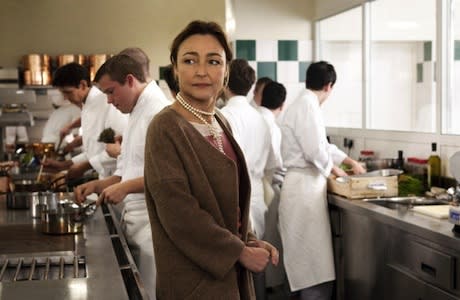In the late '80s, Daniéle Delpeuch (a woman who made a name for herself a decade prior selling Foie Gras to some of France's top chefs), left her life in France's Périgord region to be a personal chef in Paris for President François Mitterrand. Amidst the all-male cooking staff of the Élysée Palace, she prepared hearty, traditional country fare for the 21st president for roughly two years before tendering her resignation and eventually taking a chef gig on an Antarctic expedition.
Christian Vincent's clumsily metaphoric, very loose biopic about her experiences as the Presidential chef begins near the end of this expedition, with an Australian documentarian learning that Delpeuch — here named Hortense Laborie (Catherine Frot) — has no interest in being scrutinized or talking about Mitterrand. Her motivations for travelling to the far end of the world are made deliberately vague, just as her impenetrable gaze and unwaveringly stoic disposition are juxtaposed awkwardly, but affably, against the casual nature of everyone else on the icy, barren continent, before the story jumps back to contextualize how she arrived at where she is.
Initially, Laborie's outlook is one of subdued excitement, wondering what meals she might prepare for the President, while his staff is more concerned with her etiquette and knowledge of political history. She learns quickly that she's in an awkward situation, inadvertently stepping on the toes of the main kitchen staff by merely existing (something that's fostered through passive-aggressive comments and an eventual blowout about the definition of "dessert"). Laborie also learns of the endless bureaucratic scrutiny that goes into each apparently incidental decision about dietary restrictions, budgets, cuisine preference and course preparation by an endless litany of people that ultimately won't even be consuming the food.
The rationale behind these many obstacles that separate the chef from the President aren't given a great deal of consideration beyond blanket vilification, representing the inherently convoluted nature of a political machine preoccupied with the incidental, rather than the bigger picture. How or why a third party might impose a dietary restriction on Mitterrand or suggest to Laborie not spend money extravagantly to purchase the rarest of foods aren't concerns within the context of a story that's content to remain myopic, taking a goofy, altogether broad approach to Laborie's sneaky methods of gaining menu approval from the President without intervention.
Since the majority of the runtime is preoccupied with an endless array of cooking montages and close-ups of food (exploiting the hilarious insanity of a self-hating culture of repressed drones with eating disorders obsessed with food, but afraid to consume it), there's little time to consider bigger ideas. As such, our protagonist's eventual decision to step away from the headache of arbitrary bureaucratic nonsense doesn't have a great deal of emotional heft or significance, existing mostly as a narrative necessity to facilitate, and justify, the photography of overpriced, deliberately ornate cuisine.
Essentially, Haute Cuisine is a breezy, throwaway film that's as banal as it is unnecessary, being little more than a gussied up version of the sort of pap shown on the Food Network.
(Mongrel Media)Christian Vincent's clumsily metaphoric, very loose biopic about her experiences as the Presidential chef begins near the end of this expedition, with an Australian documentarian learning that Delpeuch — here named Hortense Laborie (Catherine Frot) — has no interest in being scrutinized or talking about Mitterrand. Her motivations for travelling to the far end of the world are made deliberately vague, just as her impenetrable gaze and unwaveringly stoic disposition are juxtaposed awkwardly, but affably, against the casual nature of everyone else on the icy, barren continent, before the story jumps back to contextualize how she arrived at where she is.
Initially, Laborie's outlook is one of subdued excitement, wondering what meals she might prepare for the President, while his staff is more concerned with her etiquette and knowledge of political history. She learns quickly that she's in an awkward situation, inadvertently stepping on the toes of the main kitchen staff by merely existing (something that's fostered through passive-aggressive comments and an eventual blowout about the definition of "dessert"). Laborie also learns of the endless bureaucratic scrutiny that goes into each apparently incidental decision about dietary restrictions, budgets, cuisine preference and course preparation by an endless litany of people that ultimately won't even be consuming the food.
The rationale behind these many obstacles that separate the chef from the President aren't given a great deal of consideration beyond blanket vilification, representing the inherently convoluted nature of a political machine preoccupied with the incidental, rather than the bigger picture. How or why a third party might impose a dietary restriction on Mitterrand or suggest to Laborie not spend money extravagantly to purchase the rarest of foods aren't concerns within the context of a story that's content to remain myopic, taking a goofy, altogether broad approach to Laborie's sneaky methods of gaining menu approval from the President without intervention.
Since the majority of the runtime is preoccupied with an endless array of cooking montages and close-ups of food (exploiting the hilarious insanity of a self-hating culture of repressed drones with eating disorders obsessed with food, but afraid to consume it), there's little time to consider bigger ideas. As such, our protagonist's eventual decision to step away from the headache of arbitrary bureaucratic nonsense doesn't have a great deal of emotional heft or significance, existing mostly as a narrative necessity to facilitate, and justify, the photography of overpriced, deliberately ornate cuisine.
Essentially, Haute Cuisine is a breezy, throwaway film that's as banal as it is unnecessary, being little more than a gussied up version of the sort of pap shown on the Food Network.




